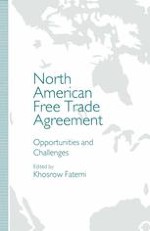1993 | OriginalPaper | Chapter
Introduction
Author : Khosrow Fatemi
Published in: North American Free Trade Agreement
Publisher: Palgrave Macmillan UK
Included in: Professional Book Archive
Activate our intelligent search to find suitable subject content or patents.
Select sections of text to find matching patents with Artificial Intelligence. powered by
Select sections of text to find additional relevant content using AI-assisted search. powered by
The benefits and/or costs of NAFTA notwithstanding, the three member-states of the agreement are independent nations with individual, and sometimes conflicting, perspectives. Furthermore, their partnership in NAFTA notwithstanding, the bilateral issues between the countries remain strong and in force. Part III of this volume examines these specific issues. In Chapter 8, Ricardo Grinspun analyzes the impact of the Canada-U.S. Free Trade Agreement — and potentially of NAFTA — on the Canadian manufacturing sector. He maintains that some provisions of the Canada-U.S. FTA will not be fully implemented until the end of the decade, and therefore it is too early to pass final judgement on the effects of the agreement on the Canadian economy. Nevertheless, Grinspun uses the experience of the first four years of the agreement to reach certain conclusions. He argues that the Canada-U.S. FTA cannot be evaluated independently from the general economic policies of the Canadian government and that ‘a better way to picture the Canada-U.S. FTA is as one element in the overall economic policy of the government.’ Using this approach, Grinspun concludes that ‘the Canadian government has done it all wrong’, and that ‘the Canada-U.S. FTA has both costs and benefits; however the economic policies of the government have created a situation where Canada is paying the costs of the agreement but is unable to realize the gains to be had from it’.
